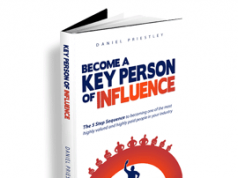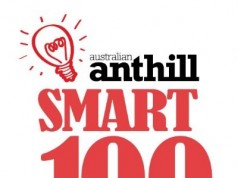The following SMART 100 profile and the information it contains is a duplication of content submitted by the applicant during the entry process. As a function of entry, applicants were required to declare that all details are factually correct, do not infringe on another’s intellectual property and are not unlawful, threatening, defamatory, invasive of privacy, obscene, or otherwise objectionable. Some profiles have been edited for reasons of space and clarity. More about the SMART 100.
This innovation initially came to life when…
Papyrus Australia founder Ramy Azer previously sold traditional papyrus in Europe and realised the demand for this environmentally-friendly paper was greater than supply. After completing a Mechanical Engineering degree in SA, Azer investigated alternative fibre resources readily available in Australia and various manufacturing processes. Following a detailed research and selection process, banana trunks were identified as an ideal choice. Papyrus’ pilot plant was established in Lonsdale, South Australia in April 2007. In February 2008, Papyrus established its first commercial manufacturing facility at Walkamin in Far North Queensland. In November 2009, Papyrus successfully began continuous production of its banana fibre products.
WHAT & HOW
The purpose of this innovation is to…
The Papyrus technology produces paper, cardboard, veneer and fibreboard products to provide the paper and timber industries with a low-cost, environmentally sustainable solution. It will address the increasing costs of current fibre production and the growing demand for products.
It does this by…
The Papyrus technology converts the waste trunk of the banana palm into alternatives to forest wood products to be used in the paper, packaging, furniture, building, construction and other industries. The trunk of the banana palm was identified as an ideal source of fibre because it is renewable and abundant, available all year and has no other viable use.
PURPOSE & BENEFITS
This innovation improves on what came before because…
Unlike traditional pulping methods, the Papyrus process does not consume any water or chemicals and produces no chemical effluent or landfill. It also requires less energy and has significantly lower costs. Depending on the plant type and location, a banana palm will produce a new trunk every six to twelve months, unlike timber sources that have a long growth cycle.
Its various benefits to the customer/end-user include…
The products produced are non-toxic, water-repellent, fire-retardant, are stronger and lighter than most conventional fibre materials and have a distinctive look and feel. The materials and products able to be produced are many and varied across a multitude of industries.
COMPETITIVE LANDSCAPE
In the past, this problem was solved by…
Papyrus is a world-first technology. Previously there was no economically viable use for the 2.5 billion tonnes of banana trunks annually going to waste globally. Conventional pulping technologies have used recycled materials as a means to reduce the environmental impact. However recycled fibre products still require high energy outputs, water, and chemicals and produce large amounts of chemical effluent and landfill.
Its predecessors/competitors include…
There is no similar technology to Papyrus. Other fibre alternatives include bamboo, kenef and hemp. However these are grown specifically for fibre so the associated production costs are higher and unlike Papyrus technology, they present chemical, energy and pollution problems.
TARGET MARKET
It is made for…
Papyrus products can be utilised across a wide range of industries including paper, packaging, furniture, building, construction, textiles and other industries. It is estimated that the banana fibre segment of the veneer and board industry worldwide will be worth over US$20 billion annually by 2020. The company’s commercialisation strategy is to become a technology licensing company, assisting suitable entities to establish veneer and banana fibre production factories in locations where banana is grown.
DISTRIBUTION STRATEGY
It is available for sale through…
Currently Papyrus Australia has an export agreement with European veneer company 3W Tout Bois for their entire production output and they have received interest from other European companies. Interested manufacturers can contact Papyrus directly to discuss opportunities.
Our marketing strategy is to…
Papyrus Australia promotes its technology through attendance to international shows like the Monaco Yacht Show, its European agent 3W Tout Bois, shareholder announcements, and its website as well as a public relations program in Australia which covers media relations, speaking engagements, events and more.
SUPPORTING IMAGES AND/OR VIDEO
SHOW YOUR SUPPORT FOR THIS INNOVATION
While the judging is now officially over, you can still show your support for this innovation in one of the following three ways:
- Hit the VOTE UP button: Top left of each page (Not available for IE users)
- Trigger a Reaction: Re-Tweet, Like on Facebook, etc.
- Leave a Comment: Share the love!
To check out the Anthill SMART 100 Readers’ Choice winner for 2010, click here.





![How to confidently raise venture capital… with Jack Delosa [CHEAT SHEET]](https://anthillonline.com/wp-content/uploads/2016/04/jack-de-losa-confidently-raising-venture-NFSU-rebrand-01.pdf-Box-2016-04-19-12-37-42-300x194.png)
![Networking is for suckers… master Inbound Marketing [FREE REPORT]](https://anthillonline.com/wp-content/uploads/2015/03/inboundreloaded-100x75.png)
![How to pitch sales and marketing ideas to your boss with James Tuckerman [FREE REPORT]](https://anthillonline.com/wp-content/uploads/2015/07/Render-3-100x75.png)
![Four principles to creating dedicated customers…or zombie loyalists with Peter Shankman [Free report]](https://anthillonline.com/wp-content/uploads/2015/11/Screen-Shot-2015-11-26-at-11.16.26-100x75.png)
![How did Sean Clark build a $300 million turnover company from a $500 AdWords investment? [CHEAT SHEET]](https://anthillonline.com/wp-content/uploads/2016/03/SEAN-CLARK-cheatsheet-NSFU-02.pdf-Box-2016-03-16-14-43-21-100x75.png)
![The Alchemy of Negotiation with Matt Lohmeyer [FREE REPORT]](https://anthillonline.com/wp-content/uploads/2015/07/Capture-100x75.jpg)
![No need for disco balls at your next office party. A slab of Heineken will light the way! [VIDEO]](https://anthillonline.com/wp-content/uploads/2013/04/HeinekenIgnite-300x350.jpg)

![The Ultimate Social Media Almanac with James Tuckerman [Cheat Sheet]](https://anthillonline.com/wp-content/uploads/2015/11/Screen-Shot-2015-11-26-at-11.24.55-300x194.png)
![How Master the Art of Sales Even if it Makes You Feel All Weird and Icky Inside with Phil Anderson [CHEAT SHEET]](https://anthillonline.com/wp-content/uploads/2015/08/PHIL-ANDERSON-COVER-100x75.png)
![Strategic Alliances with Simone Novello [FREE INFOGRAPHIC]](https://anthillonline.com/wp-content/uploads/2015/08/Capture6-100x75.jpg)
![How to build a retail empire with James Webber [FREE REPORT]](https://anthillonline.com/wp-content/uploads/2015/06/james-webber-instagram-memes-01-100x75.jpg)
![New Zealand’s Xero eyes US IPO, further disruption as subscribers increase [INFOGRAPHIC]](https://anthillonline.com/wp-content/uploads/2014/07/sruuuuujana-212x194.png)
![Ever wonder if your ‘content marketing’ is really just crap? You gotta see this! [INFOGRAPHIC]](https://anthillonline.com/wp-content/uploads/2014/08/content-100x75.jpg)
![7 Business Lessons From Game of Thrones [INFOGRAPHIC]](https://anthillonline.com/wp-content/uploads/2014/10/infographic-games-of-thrones-041-100x75.jpg)
![How to build your own Media Empire… In seven steps with Nathan Chan [INFOGRAPHIC]](https://anthillonline.com/wp-content/uploads/2014/10/Nathan-Chan-Infographic-e1413419529176-100x75.jpg)
![5 Business Lessons From Tinder [INFOGRAPHIC]](https://anthillonline.com/wp-content/uploads/2014/10/Tinder-Elegant-Infographic-100x75.jpg)



